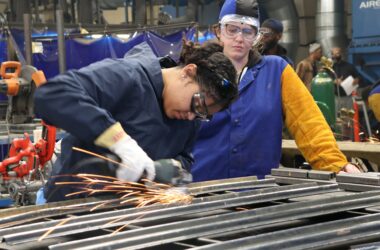The automotive industry is undergoing a seismic shift. As the world grapples with climate change and the urgent need to reduce carbon emissions, electric vehicles (EVs) have emerged as the beacon of hope.

Leading the charge among traditional automakers is Ford, a company synonymous with the very history of automobiles. However, the road to electrification is not without its bumps, as we’ve just seen by Ford’s recent decision to halt work on its $3.5 billion EV battery plant in Michigan.
A Strategic Pause In Michigan
Located near the town of Marshall in southern Michigan, the proposed battery plant represented a significant step in Ford’s commitment to a greener future. With plans to employ 2,500 individuals, the facility was set to become operational by 2026. But as with any major corporate decision, several factors play a role.
The United Auto Workers (UAW) strike against major automakers, including Ford, GM, and Stellantis, has been a significant point of contention. While Ford’s spokesperson, T.R. Reid, did not directly link the plant’s pause to the ongoing negotiations, the timing raises eyebrows, and chances are there is a connection between the strike, and the fact that the battery plant is now on hold.
The UAW’s concerns are not unfounded. The transition to EVs, while environmentally commendable, brings with it a set of challenges for the workforce. Electric vehicles, with their fewer moving parts, require less labor for assembly compared to their gasoline-powered counterparts. This has led to apprehensions about potential job losses and wage reductions.
UAW President Shawn Fain’s strong words against Ford’s decision underscore the depth of these concerns. Labeling the move as a “shameful, barely-veiled threat,” Fain highlighted the historical context, pointing out the closure of 65 plants by the Big Three automakers over the past two decades.
A Chinese Connection To Michigan
Beyond labor issues, Ford’s Michigan battery plant has been a focal point of geopolitical and technological discussions. The automaker’s collaboration with China’s Contemporary Amperex Technology Co. (CATL), the world’s leading battery manufacturer, has drawn scrutiny. Some politicians and industry watchers have raised alarms about Ford’s reliance on “Chinese technology.”
However, it’s essential to view this partnership in the broader context of global supply chains and technological advancements. CATL’s expertise in battery technology is undeniable, and their collaboration with Tesla further cements their position in the industry. For Ford, partnering with a global leader like CATL is a strategic move to ensure they remain at the forefront of the EV revolution.
Looking Ahead To An EV Future
Despite the pause, Ford’s electric ambitions remain clear. The company had previously announced plants in Kentucky and Tennessee and has set a target to produce 2 million electric vehicles globally by 2026. The Michigan battery plant, with its potential to power around 400,000 EVs annually, is a testament to Ford’s commitment.
Yet, the challenges are manifold. From ensuring a just transition for workers to navigating global partnerships and technological dependencies, the journey to electrification is complex. The recent pause on the Michigan plant is a reminder that while the destination is clear, the path is filled with decisions that weigh the immediate against the future, the local against the global.
Challenges In Adapting to EVs
In conclusion, Ford’s decision to halt its Michigan battery plant’s construction offers a microcosm of the broader challenges facing the automotive industry in its shift to electric. Balancing labor concerns, technological partnerships, and strategic investments will be key for automakers as they navigate this new landscape. As the industry continues its march towards a sustainable future, one can only hope that the interests of workers, corporations, and the planet can align in harmony.
The auto industry faces multifaceted challenges in adapting to EV technology. Traditional automakers grapple with overhauling legacy manufacturing infrastructures, retraining workforces, and securing consistent supplies of battery components in a competitive market.
Additionally, they must navigate evolving regulatory landscapes, establish charging infrastructures, and address range and charging time concerns to gain consumer trust. This transition also necessitates significant capital investments, all while maintaining profitability in their conventional vehicle segments. Ford’s decision is, of course, emblematic of this challenge.
WeInvests is a financial portal-based research agency. We do our utmost best to offer reliable and unbiased information about crypto, finance, trading and stocks. However, we do not offer financial advice and users should always carry out their own research.
Read More













